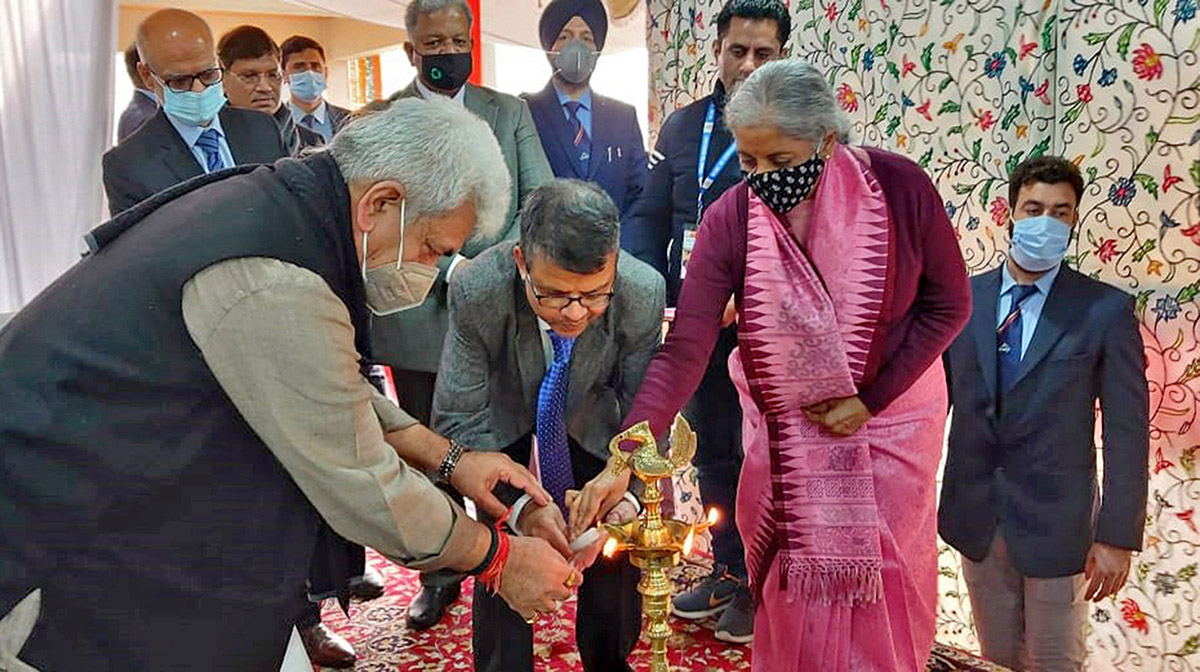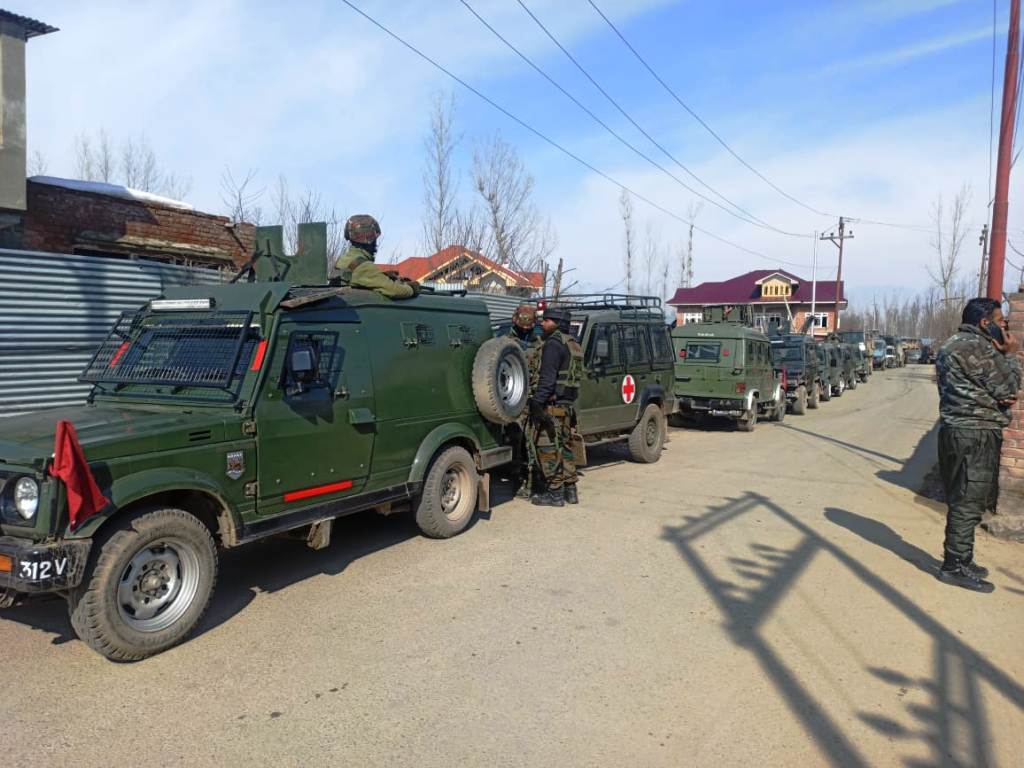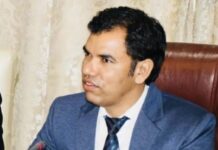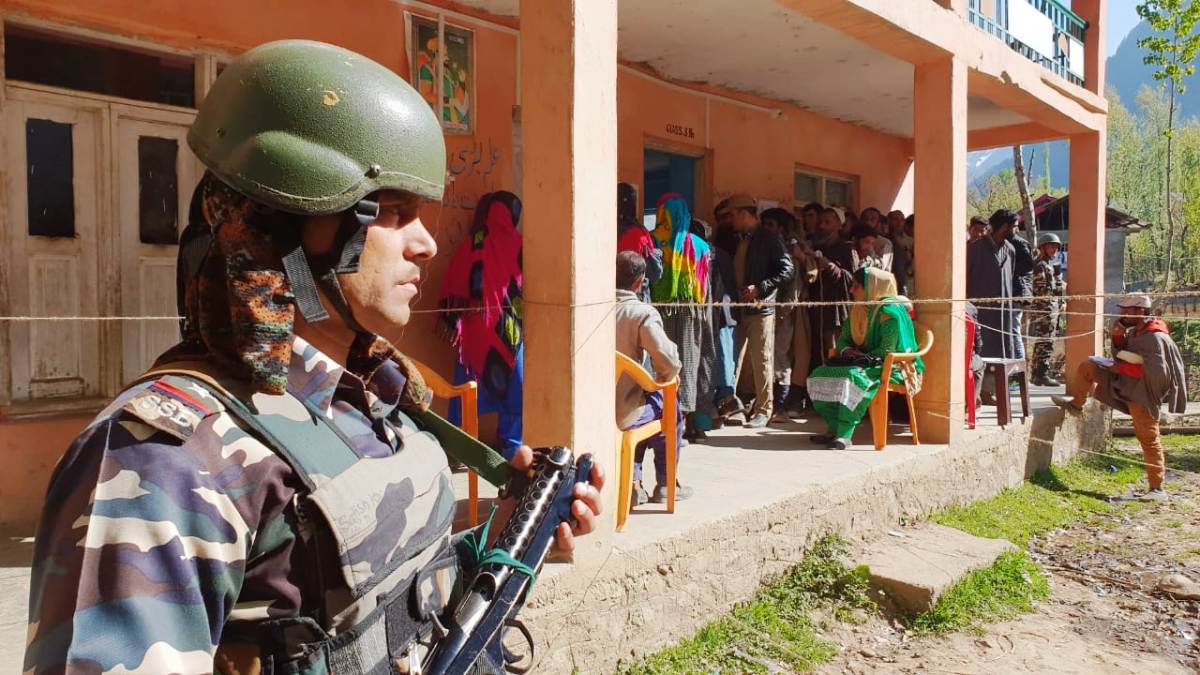SRINAGAR: Jammu and Kashmir is anticipated to spend Rs 1,18,728 crore in the fiscal starting April 1, 2024. It includes an expenditure of Rs 80,162 crore on committed heads including salary, pensions and establishments as the capital expenditure stands at Rs 38,566 crore.

The budget proposals were presented by Finance Minister, Nirmala Sitharaman in the Lok Sabha on Monday.
Income
On the income side, the budget estimates suggest Rs 20654 crore (17.39 per cent of total income from all sources) will be Jammu and Kashmir’s own tax revenue, Rs 9661 crore (8.13 per cent) will be non-tax revenue, Rs 56814 crore (47.85 per cent) will come from centre as devolution and grant in aid and the government will create additional resource mobilisation of Rs 10732 crore, which 9.03 per cent of the total fund requirement in the year.
Besides, the estimates suggest that the government will borrow Rs 20867 crore (17.57 per cent) of which Rs 101 crore will be non-debt creating.
A detailed own resource income explains that Jammu and Kashmir will generate Rs 14000 crore from SGST and IGST, Rs 2600 crore as Excise Duty, Rs 1900 crore as taxes on sales, Rs 800 crore as stamp and registration duty and another rs 1354 crore from ‘other’ taxes. On the non-tax front, the Jammu and Kashmir government anticipates collecting Rs 6000 crore as a power tariff and another Rs 3661 from other sources.
Expenditure
The budget suggests that Rs 31566 crore (26.58 per cent of total expenditure) would go to salaries, Rs 13651 (11.49 per cent) to pensions, Rs 8017 crore (6.75 per cent) to ‘other’ primary revenue expenditures; Rs 6500 crore (5.47 per cent) to power purchase, Rs 866 crore (0.72 per cent) for maintenance, repairs, materials and supplies, Rs 4855 crore (4.08 per cent) as grant in aid and another Rs 4435 crore (3.73 per cent) towards Central Sponsored Scheme implementation.
Debt management and interest payment has always remained crucial. In the next fiscal, the budget estimates suggest, the Jammu and Kashmir government will spend Rs 10272 crore (8.65 per cent) on the payment of interest on loans, Rs 11710 (9.86 per cent) crore on repayment of debts and Rs 25 crore as loans and advances.
The amount that will go into the developmental activities includes Rs 15919 crore (13.4 per cent) that will be spent under Union Territory, districts and through the Prime Minister Development Programme (PMDP) and another Rs 10412 crore (8.76 per cent) for implementation of various central sponsored schemes. A Rs 500 crore corpus is slated to be spent on equity and investment.
The budget documents put the accumulated overall debt at Rs 112797 crore which is 49 per cent of Rs 227927, the GDP of Jammu and Kashmir at current prices.
Interim Budget
The budget documents proposed a vote-on-account for Rs 59,364 crore for Jammu and Kashmir. It includes capital expenditure involves Rs 19,283 crore and revenue expenditure Rs 40,081 crore. The proposed interim budget includes Rs 48,930 crore as revenue receipts and Rs. 10,434 crore as capital receipts.
The documents show that total gross receipts in respect of the proposed vote on account for 2024-25 are estimated at Rs 75,932 crore, including the provision for ways and means advances of Rs 16,568 crore.
The Union Finance Ministry has sought parliamentary approval only for Rs 75,932 crore, including the provision for ways and means advances of Rs 16,568 crore.
The interim budget was presented as a Model Code of Conduct and would come into place likely in the first week of March for Lok Sabha elections which would be held in April- May. The UT’s full budget will be presented once the next government is in place after the 2024 parliamentary elections.
LG Appreciates
In Jammu, LG Manoj Sinha lauded the Interim Budget 2024-25 and expressed gratitude to Prime Minister Narendra Modi and Finance Minister Nirmala Sitharaman.
“Grateful to Hon’ble PM Shri Narendra Modi Ji & Hon’ble FM Smt. Nirmala Sitharaman Ji for J&K’s interim Budget 2024-25, which is dedicated to farmers, women, youth, marginalized section of society and seeks to strengthen the grass-root democracy in the Union Territory,” the LG tweeted.“Interim budget highlights the government’s commitment of rapid economic growth & it ensures that the growth is socially inclusive and sustainable. It focuses on fast expansion of agricultural economy & addresses the issue of regional imbalances & seeks to bridge rural-urban divide.”
The tweet further added: “The budget 2024-25 creates an enabling environment for investment & seeks to accelerate industrial growth.The budget will ensure that industries generate more employment, provide support to thrust areas identified for investment & it will encourage start-up ecosystem in the UT. Budget focuses on skill development & employment of Nari Shakti. It seeks to ensure that benefits of rapid economic growth flow equitably to the women in rural & urban areas, SHGs are empowered & women-owned business enterprises are provided access to resources & networks”.
DIPR Statement
Meanwhile the DIPR Jammu and Kashmir issued the followed detailed statement, which is being published verbatim:
“The Revised Estimates for 2023-24 and Interim Budget 2024-25 of Government of Jammu and Kashmir were today placed before the Parliament by Union Finance Minister, Smt. Nirmala Sithraman. The two Appropriation Bills on the Supplementary Budget for 2023-24 and Vote on Account for 2024-25 will be considered by the Lok Sabha and Rajya Sabha in this regard.
Finance Department of the UT had drafted the Supplementary Budget for the current year and the Interim Budget for the next financial year. For this, the Department had assessed the revenue receipts of the UT Government from GST, motor spirit tax, excise, and stamp duty. Further, the non-tax revenue from electricity and water supply, mining royalty, timber sales, annual rent from industrial lands, etc were also examined. The own revenue of the UT Government has been estimated at Rs 20,867 crore. The UT Government also pursued the Government of India for getting central financial assistance.
Lieutenant Governor, Shri Manoj Sinha and Chief Secretary, Shri Atal Dulloo led the UT’s efforts in this direction. Crucial meetings were held in August 2023, October 2023 and January 2024 in Ministry of Home Affairs and Ministry of Finance to review these demands of the UT Government. Union Home Minister and Union Finance Minister personally reviewed the fiscal management of the UT Government in recent months.
Accordingly, the Central Government has agreed to provide Rs 41751.44 Cr to the UT Government in this financial year and Rs 37277.74 Cr in the next financial year. These assistance figures have been duly captured in the Revised Estimates of 2023-24 and the Budget Estimates of 2024-25 of the Union Government. This assistance will be provided under the MHA’s demand no 58 for assistance to the UT. This assistance includes the normal assistance (resource gap) to the UT Government, equity contribution for hydropower projects at Kiru, Kwar and Rattle, etc. These assistance figures are captured in the Union Budget which is already before the Parliament and the same will be taken up for discussion before the UT’s interim budget.
Building on this, the Government of Jammu and Kashmir drafted its Supplementary Budget for 2023-24 and Vote on Account for 2024-25. Finance Department also drafted the two Appropriation Bills (Supplementary Demands and Vote on Account) for placing before the Parliament.
The revised estimates for 2023-24 is overall lower than the budgeted estimates 2023-24 as the UT government was successful in streamlining its expenditure. The supplementary demands for 2023-24 ofRs 8,712.90 Cr pertain to the four Departments of Finance, Power Development, Hospitality and Protocol and Cooperatives.
The supplementary budget is required by the Finance department in view of the repayment of debt, while Power Development department needs to provide for power procurement. The Hospitality and Protocol department intends to develop the new J&K Bhawan at Dwarka, New Delhi for which land will be allotted from DDA. The Cooperative department requires the funding additionally for its new CSS, Assistance to Primary Agricultural Credit Societies (PACS).These additional demands are proposed to be catered with Supplementary Demands for the current year 2023-24.
The interim budget for 2024-25 makes provisions for the ongoing initiatives for infrastructure development, sustainable agriculture, new industrial estate, PRI level works, employment generation, developing tourism, and social inclusion. During the preparation of the interim budget proposals, consultations were held with all the Departments and various stakeholders to provide for ongoing initiatives and arrive at realistic budgetary number Rs For finalizing expenditure proposals, assessment of financing needs of infrastructure projects, social and economic measures undertaken by Departments was undertaken.
The budgetary exercise focused on the imperative of advancing the cause of the greater collective good within realistically realizable resources. While the budgetary estimate for the next financial year 2024-25 is about Rs 1,18,728 Cr, the UT Government has proposed the Vote on Account for 59,364 Cr.
This interim budget for 2024-25 covers revenue expenditure of Rs 40,081 Cr and capital expenditure of Rs 19,283 Cr. The interim budget of Jammu and Kashmir for 2024-25 provides for the ongoing measures and schemes as follows –
1) Rs 2959 Cr provisioned for tap-water connectivity for rural areas under Jal Jeevan Mission with Rs 532 crore as UT Share.
2) Rs 934 Cr for transforming agriculture and allied sectors of the UT through the Holistic Agriculture Development Programme (HADP), including provisions for IFAD-funded J&K Comprehensive Investment Plan (JKCIP).
3) Rs 1907 Cr for rejuvenating school education infrastructure and services through funding under Samagra Shiksha Abhiyan.
4) Provision of improving road connectivity with 1683 Cr for PMGSY roads,₹ 300 Cr for CRF roads, and 1000 Cr NABARD scheme.
5) Rs 1313 Cr for strengthening decentralized governance by providing for local area works of panchayat and urban local bodies.
6) Rs 1271 Cr for strengthening infrastructure and services in the health sector under National Health Mission mechanism.
7) Rs 1093 Cr for rural housing under PMAwasYojana-Grameen scheme.
8) Rs 1000 Cr for comprehensive social security coverage for Old aged, Widow and Disabled pensions by saturation approach.
9) Rs 660 Cr for J&K’s equity for in the hydro electric projects at Ratle, Kwar, and Kiru, which would provide stable revenue source and cheaper power.
10) Rs 505Cr for timely procurement of machinery, equipments,prosthetic aidsand drugs in Health sector through the dedicated corporation.
11) Rs 500 Cr for capitalization of the banks, including Cooperative Banks, Rural Banks, J&K Bank, etc.
12) Rs 450 Cr for infrastructure of new Colleges and Universities as per NEP vision.
13) Rs 430 Cr for women empowerment intervention ofLadliBeti and Marriage Assistance
14) Rs 400 Cr for construction of Transit accommodations for Kashmiri Pandit employees.
15) Rs 400 Cr for development of Industrial Estates and related infrastructure.
16) Rs 370 Cr under Swachh Bharat Abhiyan (Urban) scheme.
17) Rs 390 Cr for the Flood Management Project of River Jhelum.
18) Rs 450 Cr for GST reimbursement to ensure timely reimbursement of the claims.
19) Rs 272Cr for DDC/BDC grants improving local governance at district and block level
20) Rs 174 Cr for the development of model schools under the PM-Shri scheme.
21) Rs 150 Cr for developing rooftop solar and other avenues of new and renewable energy.
22) Rs 140 Cr for the creation of Sports Infrastructure
23) Rs 100 Cr for the conclusion of the World Bank-funded Jhelum Tawi Flood Recovery Project.
24) Rs 100 Cr for Mission Youth programmes for education, skilling, and employment
25) Rs 100 Cr for heritage preservation,
26) Rs91 Cr for new tourism destinations, new circuits, Sufi circuit and identified religious circuits, ropeways, highway resting places and promotion of Golf.
27) Rs 70 Cr under infrastructure for the welfare of tribals for construction of Tribal Hostels/Milk Villages/ Nomad Shelters/Libraries for Gujjars.
28) Rs 100 Cr for sewerage projects in urban areas, Rs 70 Cr for the development of new Townships and affordable housing and Rs 50 Cr for Dal development.
29) Rs 40 Cr for Tourism promotion, Rs 15 Cr for festival promotion and for promotion of cinema/ threatre.
30) Rs 40 Cr for meeting incentives as per the provisions of the Industrial Policy and Start-ups;Rs 15 Cr for trade promotion through J&K TPO; andRs 100 Cr for Youth startup/Job fairs/employment fairs.
31) Rs 30 Cr for the establishment of cold storage and Rs 30 Cr for high-density plantation.
32) Rs 80 Cr for establishment of DDC/BDC/PRI accommodation and offices as also for security arrangements of DDC/BDC/PRI representatives.
33) Rs 59 Cr for the construction of Police Housing colony and relief and rehabilitation
34) Rs 45 Cr for the construction of Bunkers and for digitization and CCTVs in Police Stations
35) Rs 30 Cr for improving Quality in Schools, School Infrastructure, for Career Counseling and for introduction of additional Streams in Schools.
36) Rs 5 Cr for replacement of old fleet in transport sector.
The two Appropriation Bills on the Supplementary Demands for 2023-24 and Vote on Account for 2024-25 of the UT Government are likely to be considered by the Lok Sabha and Rajya Sabha during 7th to 9th February 2024.”















